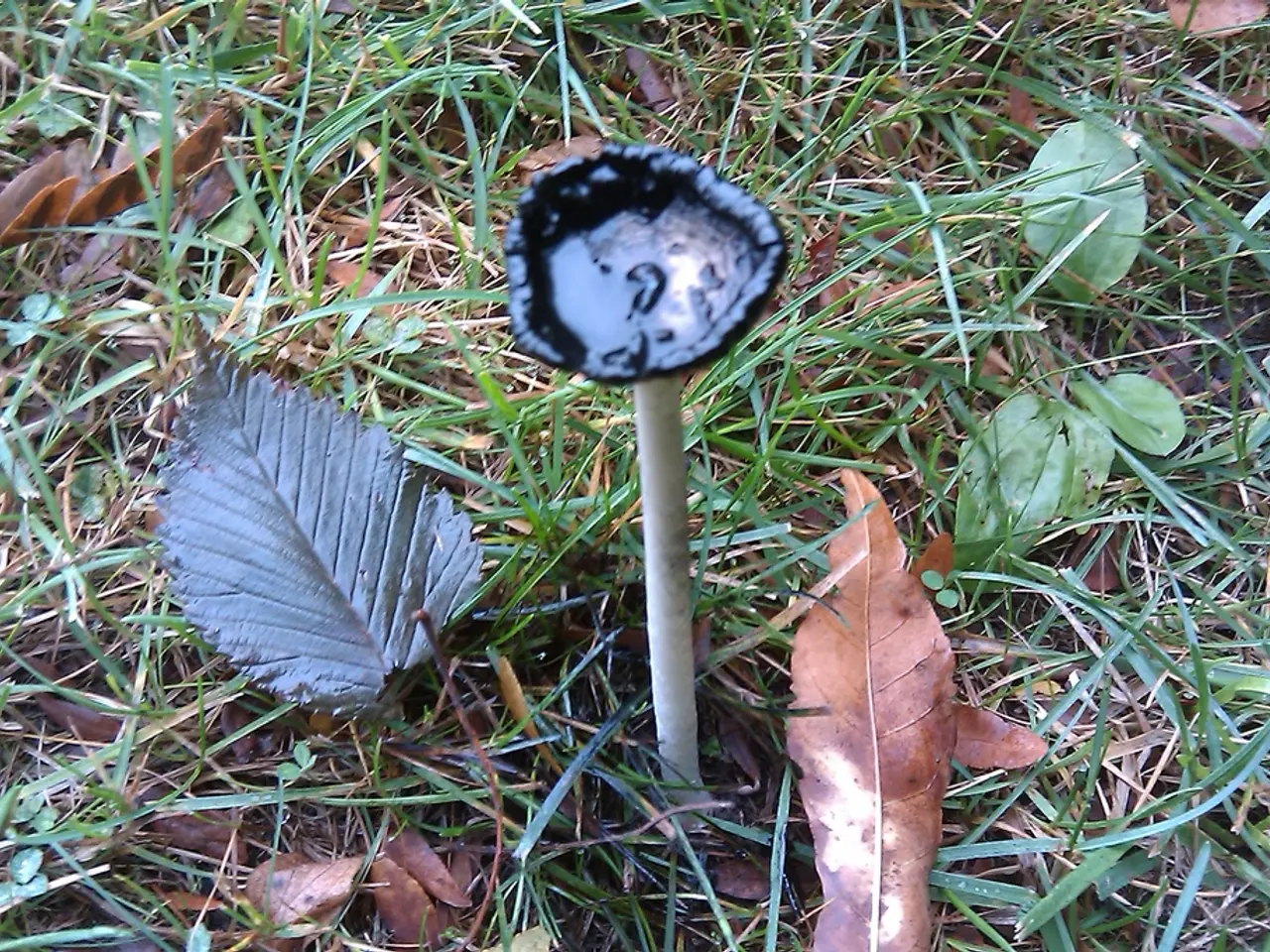Jharkhand's Concealed Forest Treasure, the Rugda Mushroom: A Natural Powerhouse Boosting Farmers' Wealth
In the heart of Jharkhand, a unique mushroom known as Rugda (Astraeus hygrometricus) thrives, playing a significant role in the local ecosystem and the diets of many tribal communities.
Conservation Status
Rugda mushrooms are a natural part of Jharkhand’s forested and grassland areas, holding cultural and nutritional importance for local communities. However, there are no specific conservation programs dedicated solely to Rugda. The mushroom grows naturally in forest ecosystems and is somewhat protected indirectly by forest conservation efforts.
Despite this, overharvesting and habitat degradation due to deforestation, shifting agriculture, and land-use changes pose threats to the natural populations of wild Rugda mushrooms. Community awareness and traditional conservation practices help in sustainable harvesting, but scientific conservation measures are limited.
Research institutions and forest departments have occasionally studied the mushroom’s ecology and distribution, suggesting the need for habitat protection and sustainable harvest protocols.
Commercial Cultivation
Commercial cultivation of Rugda in Jharkhand is currently limited or non-existent on a large scale. Unlike common cultivated mushrooms, Rugda has not been domesticated due to its specific growth requirements. Local collection and sale of wild Rugda mushrooms occur in Jharkhand’s markets, providing income to tribal and rural communities.
Some small-scale initiatives and research projects aim to explore the possibility of cultivation, but commercial production is still at a nascent or experimental stage. The promotion of mushroom cultivation in Jharkhand mostly focuses on more easily cultivated edible mushrooms rather than wild species like Rugda.
Future Prospects
Rugda mushrooms remain primarily wild-harvested in Jharkhand, with no well-established commercial cultivation. Conservation depends mostly on maintaining forest habitats and sustainable harvesting by local communities. There is growing scientific interest in studying Rugda for potential conservation and sustainable use, but large-scale cultivation and conservation programs have yet to develop.
For the most current and detailed information, local forestry departments, agricultural universities such as Ranchi University or Birsa Agricultural University, or recent research publications on Jharkhand’s mycology might provide emerging updates.
Rugda mushrooms are extremely perishable and only last three to four days. The tribal women collectors should be supported by the state government through training, equipment, and facilitation of better markets. It is important to be careful when picking wild mushrooms as some may be poisonous.
Traditional communities in Jharkhand use Rugda medicinally, particularly the spores, which are combined with mustard oil to treat burns. With proper conservation and sustainable practices, Rugda could become a certified non-timber forest product that enhances rural livelihoods, nutrition, and the indigenous food culture of Jharkhand. Basic methods such as drying, powdering, or canning would lengthen Rugda’s shelf life and provide new market opportunities.
In conclusion, Rugda mushrooms are a unique and valuable resource in Jharkhand, with potential benefits for both the local ecosystem and the people who depend on it. By supporting sustainable harvesting practices, encouraging scientific research, and exploring methods for commercial cultivation, we can ensure the continued availability of this remarkable mushroom for generations to come.
- Science plays a crucial role in understanding the ecology and distribution of Rugda mushrooms in Jharkhand.
- Health-and-wellness benefits of Rugda mushrooms are significant for local communities, particularly in treating burns.
- Fitness-and-exercise could be improved by promoting healthy cooking practices using Rugda mushrooms.
- Climate-change impacts, such as deforestation, pose threats to the wild population of Rugda mushrooms.
- Nutritionists may value Rugda mushrooms for their unique nutritional profile, particularly in indigenous food cultures.
- Women's-health issues could be addressed by supporting the tribal women collectors and implementing safer methods for picking wild mushrooms.
- Environmental-science research is crucial for understanding the habitat requirements of Rugda mushrooms and developing sustainable harvest protocols.
- Finance is essential to facilitate better markets for sustainably-harvested Rugda mushrooms, benefiting rural communities.
- Cooking techniques, such as drying, powdering, or canning, can extend Rugda's shelf life and create new market opportunities.
- Lifestyle adaptations, promoting sustainable practices, and supporting local communities are key to preserving Rugda mushrooms for future generations.
- Food-and-drink industries may explore the potential of Rugda mushrooms in developing unique products or recipes.
- Investing in companies focusing on sustainable Rugda cultivation and processing could contribute to wealth-management strategies.
- Wealth-management institutions should consider the potential of Rugda mushrooms as a means of enhancing rural livelihoods.
- Home-and-garden enthusiasts might find interest in gardening Rugda mushrooms if commercially cultivated or supplied.
- Personal-finance education could empower local collectors and entrepreneurs in managing their income from Rugda mushrooms.
- Global-cuisines, particularly from Jharkhand, could feature Rugda mushrooms, enriching culinary diversity.
- Real-estate development in and around Rugda mushroom habitats should prioritize habitat preservation and sustainable practices.
- Data-and-cloud-computing technologies can support scientific research on Rugda mushrooms, encouraging collaboration and knowledge sharing.
- Gardening Rugda mushrooms at home could serve as a mindfulness activity, promoting a sustainable and self-sufficient lifestyle.
- Sustainable-living advocates should support the conservation and responsible use of Rugda mushrooms as part of their cause.
- Technology advancements can lead to innovation in Rugda mushroom cultivation, processing, and marketing.
- Healthy-cooking practices utilizing Rugda mushrooms can contribute to overall health and wellness.
- Education-and-self-development initiatives should include Rugda mushrooms in their curricula, promoting lifelong learning and skills training.
- Personal-growth can be achieved by learning about Rugda mushrooms, their cultural significance, and potential economic benefits.
- Career-development opportunities in Rugda mushroom conservation, cultivation, and scientific research are emerging, particularly in online education platforms.




